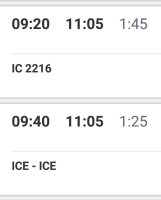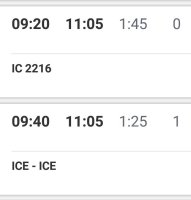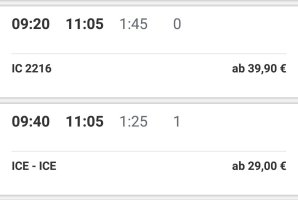
Which alternative would you choose? Of course the faster one, right? Hint: up to the second half of the 90s the slower connection was not even offered as an alternative, since it was intended to show only connections which were fastest in time.

Now it is obvious what was visible also before, the slower connection is a direct connection, with the faster connection you have to change train. How would you decide now? And how would you decide if you were a mother, travelling alone with a big suitcase and a toddler in the buggy?

And, knowing prices, what would be your favourite connection? Is the decision now perhaps dependent on the fact that you have to live on a student loan?
The examples should make it evident that: There is not only one, best solution for all passengers. Alternatives will always be judged upon the actual context. On the way to a job interview the student living on a student loan would probably not choose the cheapest connection if the potential employer would reimburse the travel expenses.
But would it then not be preferable to indicate beforehand if one wants to travel quickly, comfortably or cheaply? This thought is obvious but do we not want to see the alternatives? If we are offered only fastest or optimized fastest connection do I not want to know then how much I can save with a slower connection? Would I not want to know how much money I could save if the travel time would be 3:30, for example instead of 3:10 ?
With little or no luggage would I not be interested in connections which would save a change of train but only be five minutes slower?
We came to the conclusion that a travel information must be multi-criterial in its algorithmic basis in order to find out the best connection for as many passengers as possible.
And furthermore we think that it should be possible to add more criteria to the system without little effort lateron. There are enough ideas, for example the fact that not many passengers enjoy travelling in full trains (criteria "capacity utilization"). Or we do not want to miss our appointment because the train had an "operational disruption" (criteria "liability of operation").